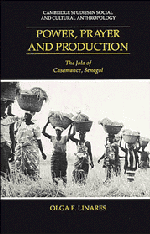Book contents
- Frontmatter
- Contents
- List of illustrations
- List of tables
- Acknowledgements
- Note on orthography
- INTRODUCTION: IDEOLOGY AND AGRARIAN CHANGE
- PART I THE POLITICAL ECONOMY OF SAMBUJAT
- Chapter 1 The power of the spirit-shrines
- Chapter 2 Rice fields and labor relationships
- Conclusions to Part I
- PART II AT THE CROSSROADS: THE KUJAMAAT JOLA OF JIPALOM
- PART III MANDING MODELS AND FATIYA MORES
- EPILOGUE: THE JOLA IN THE PRESENT NATIONAL SCENE
- Notes
- References
- Index
- Cambridge Studies in Social and Cultural Anthropology
Chapter 1 - The power of the spirit-shrines
Published online by Cambridge University Press: 04 November 2009
- Frontmatter
- Contents
- List of illustrations
- List of tables
- Acknowledgements
- Note on orthography
- INTRODUCTION: IDEOLOGY AND AGRARIAN CHANGE
- PART I THE POLITICAL ECONOMY OF SAMBUJAT
- Chapter 1 The power of the spirit-shrines
- Chapter 2 Rice fields and labor relationships
- Conclusions to Part I
- PART II AT THE CROSSROADS: THE KUJAMAAT JOLA OF JIPALOM
- PART III MANDING MODELS AND FATIYA MORES
- EPILOGUE: THE JOLA IN THE PRESENT NATIONAL SCENE
- Notes
- References
- Index
- Cambridge Studies in Social and Cultural Anthropology
Summary
Scholars have remarked upon two striking features of Jola society: the highly developed wet-rice system, and the greatly elaborated ukíin (bakíin, sing.) or spirit-shrine system. These features are inextricably connected. Although some effort has been made to relate Jola economic behavior to their religious beliefs and ritual practices (most successfully by Baum 1987), a great deal remains to be done. There is still a need for a working theory that can adequately model this interaction.
Political economy can provide such a theory (see Staniland 1985). For it departs from the premise that politics and the economy are dialectically related through complex chains of mutual causation. And it places power where it should be, as the legitimating force shaping productive arrangements and labor relationships. Legitimation is a political process. It can be achieved through consensus and shared ideals; it does not require outright coercion nor the use of force. In societies where bureaucracies are missing and there are no standing armies, as among the relatively self-sufficient rural communities of Africa, religious beliefs and ritual practices often reinforce many aspects of political economy. Cultural ideologies and symbol systems usefully provide a legitimating idiom for the values and aspirations surrounding the economics of role behavior.
Among the Esudadu Jola land is individually “owned” and inherited, and it is also largely worked by household labor. This creates its own problems and contradictions. Rice that is grown in standing water, in fields that are under permanent cultivation, requires a great deal of technical expertise.
- Type
- Chapter
- Information
- Power, Prayer and ProductionThe Jola of Casamance, Senegal, pp. 15 - 51Publisher: Cambridge University PressPrint publication year: 1991

